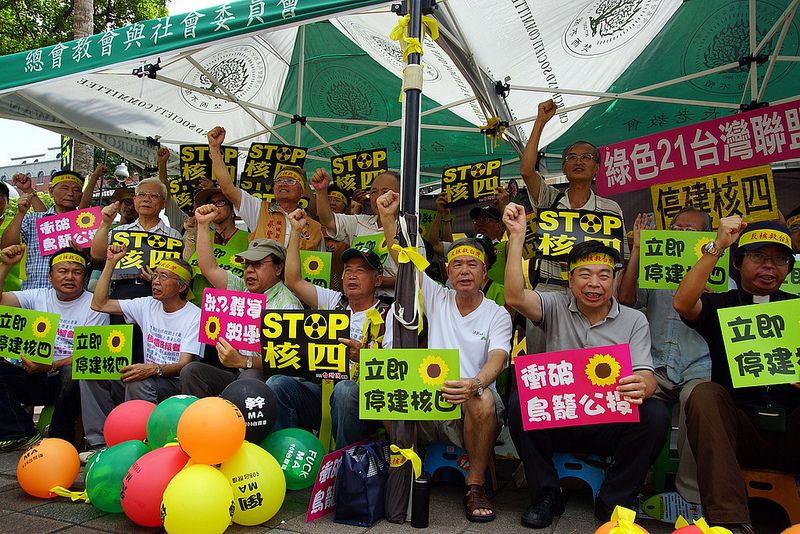Lawmakers exchanged punches [1] in Taiwan's parliament on August 2, 2013 ahead of a vote on whether or not to hold a referendum on the island's controversial fourth nuclear plant [2].
The plant, which has been under construction for more than a decade, is a divisive issue for Taiwan and has been met with large-scale protests because of safety concerns [3]. The next round of debate regarding the referendum controversy [4] [zh] will take place on August 6, 2013. Legislators from the Democratic Progressive Party (DPP) will continue to try to delay the vote, while ruling party Kuomingtang wants to pass the referendum by end of August.
The question of letting the people vote on the plant's fate has thrust Taiwan's tough referendum requirements into the spotlight. Lawmakers from the DPP oppose a referendum, calling the mechanism unfair.
The Referendum Act in Taiwan, which was was passed [5] [zh] in November 2003, requires 50 percent of voters to participate in the referendum or else the proposal in the referendum will be rejected. In the last ten years, six national referendums have been proposed, but none of them was passed.
As the act requires a referendum to meet the participation threshold of half of the electorate, even if the majority of the voters reach a consensus, the referendum will become invalid. Since the voting rate in Taiwan is about 75 percent, the mobilization of 30 percent of voters to boycott the referendum will override a consensus reached by a majority of the voters.
 [6]
[6]Protesters demonstrated outside the Legislative Yuan against the fourth nuclear plant and the referendum. Photo taken by 陳逸婷, coolloud.org. Non-commercial use.
For example, in 2004 two referendums [7] [zh] did not pass even though more than 90 percent of the voters had reached a consensus.
The first one was on whether Taiwan should acquire more advanced anti-missile weapons if mainland China refuses to withdraw the missiles it has targeted on Taiwan. 45.17 percent of the electorate went to vote, and 91.8 percent of them voted yes.
The second referendum was on whether the Taiwanese government should engage in negotiations with China on President Chen’s proposed “peace and stability” framework for cross-strait interactions. 45.12 percent of the electorate went to vote, and 92.05 percent of them voted no.
Both of them failed to pass. In short, passing a referendum is more difficult than winning a presidential election in Taiwan.
Lin Yi-Hsiung [8], a member of DPP and a devoted advocate against nuclear power since 1989, is currently working on amendment to the Referendum Act, described [9] [zh] why the current Referendum Act cannot reflect the opinions of the citizens:
習慣專制的國民黨政權,為了阻遏這種人民做主的公投潮流,所以在2003年制定了所謂的「公民投票法」,以非常不合理而嚴苛的規定,使公民投票幾乎不可能舉辦或通過。十年來,除了總統及國、民兩大政黨外,沒有人有能力提案公投。而所有成案的公投案,也都沒有一個通過,可見這個公投法阻遏公投的威力有多大。
依照目前的公投法來辦理公投,不是政治人物的政治遊戲,就是在開人民的玩笑。所以,公投法制定以後,我所參與的核四公投促進會,就不再談核四公投,而只要求補正公投法。因為公投法如果不做合理的補正,依該法舉辦公投事實上不會有任何意義。
As a result of the unreasonably high threshold for passing a referendum, the advocates of a referendum prefer the wording of the question to be against their own position. For example, considering the dispute of the fourth nuclear power plant, the government and the ruling party prefer the question to be set as, “Do you want to stop the construction of the fourth nuclear power plant?” On the other hand, the opposition party prefers the referendum question to be set as, “Do you want to continue the construction of the fourth nuclear power plant?”.
The wordplay in referendum questions is not favorable to the opposition party because the government-appointed referendum committee holds the power to reject a referendum before it goes to the voting process. For example, a referendum was proposed in 2009 regarding the Economic Cooperation Framework Agreement [12]. The referendum was initiated by a joint-signature of more than 109,000 Taiwanese [13] [zh] but eventually rejected by the referendum committee because the wording of the referendum question was against the referendum proposer’s stand. After the referendum proposer made an appeal to the Supreme Court, the Supreme Court ruled that the rejection issued by the referendum committee is not consistent with any requirements stated in the Referendum Act in 2012.
Last but not least, in the current Referendum Act, if a referendum is not passed it cannot be proposed again for another eight years. Blogger Otto Hsu was [14] [zh] very anxious about the fourth nuclear power plant referendum:
在核四這種重大政策案,一旦公投了,不論結果怎樣,接下來八年都不能再提同樣的公投。
這種限制,在投票人數夠多的情形下,固然有維持安定的正面功能。但如果只有小貓二三隻出來玩[…] 也要拘束公民全體八年內不得再提同種公投,實在也是不合理。
這方面,有待修法來解決了!(或者,我們應該先公投一個新的「公民投票法」!)
This is unreasonable. We need to amend the Act to solve this problem! (Or we should have a referendum for a new Referendum Act!).